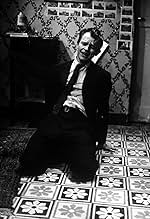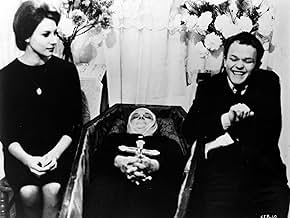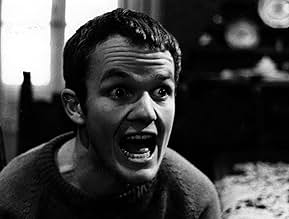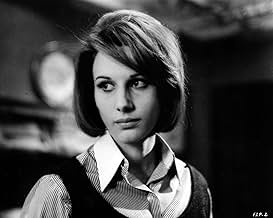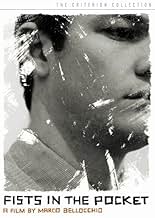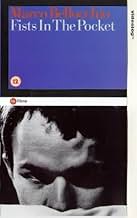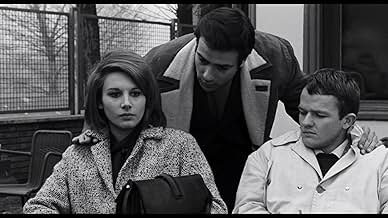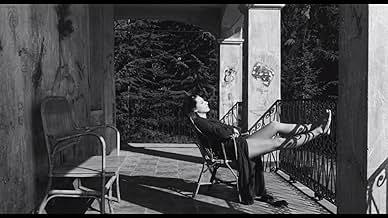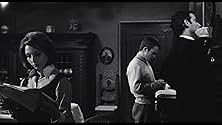IMDb RATING
7.5/10
5.4K
YOUR RATING
A young man takes drastic measures to rid his dysfunctional family of its various afflictions.A young man takes drastic measures to rid his dysfunctional family of its various afflictions.A young man takes drastic measures to rid his dysfunctional family of its various afflictions.
- Awards
- 4 wins & 5 nominations total
Pier Luigi Troglio
- Leone
- (as Pierluigi Troglio)
Jeannie McNeil
- Lucia
- (as Jenny Mac Neil)
- Director
- Writer
- All cast & crew
- Production, box office & more at IMDbPro
Featured reviews
Marco Bellocchio directs his first full-length film, and it's already a masterpiece, a milestone in the history of Italian cinema.This movie is all about contemporary uneasiness and family crisis in today's society (only, some two decades in advance). Every time I hear of family massacres on the news, I've got to think about problematic, disturbed Lou Castel deciding to get rid of his mother and younger brother for the benefit of the eldest, embodying not only a stage of criminality, but above all a wrong philosophy, a twisted point of view about life, a failed maturity. Ennio Morricone' score is just perfect, fully successful in his aim to highlight the dramatic potential of the story. Lou Castel has never acted like this, his grimacing and his usage of the dead moments are unforgettable. The frames of the mother's death are like an howl, they "send shivers down your spine". A must-see.
This first effort by writer/director Marco Bellocchio has been called a drama by some, and a horror film by others. It is both. It is neither.
It is a view of a dysfunctional family. I almost had the impression they cam from a long line of incest like The People Under the Stairs. One wants to get away, another has epilepsy, the mother is blind, one seems to be developmentally disabled, and the last, Giulia (Paola Pitagora)is really not classifiable, but she sure seems to spend a lot of time very close to her brother Ale (Lou Castel).
Ale feels sorry for his older brother, Augusto (Marino Masé) and hatches a plan to drive the rest of the family, including himself off a cliff so his brother can get on with his life.
His plan fails, so he starts doing them in one by one.
Watching him is mesmerizing. You just have to see what he is going to try next. In the meantime, the family just acts as crazy as you would expect.
Bellocchio went on to direct many more great films including A Leap in the Dark, The Prince of Homburg, and The Religion Hour. It is amazing his first was so good.
It is a view of a dysfunctional family. I almost had the impression they cam from a long line of incest like The People Under the Stairs. One wants to get away, another has epilepsy, the mother is blind, one seems to be developmentally disabled, and the last, Giulia (Paola Pitagora)is really not classifiable, but she sure seems to spend a lot of time very close to her brother Ale (Lou Castel).
Ale feels sorry for his older brother, Augusto (Marino Masé) and hatches a plan to drive the rest of the family, including himself off a cliff so his brother can get on with his life.
His plan fails, so he starts doing them in one by one.
Watching him is mesmerizing. You just have to see what he is going to try next. In the meantime, the family just acts as crazy as you would expect.
Bellocchio went on to direct many more great films including A Leap in the Dark, The Prince of Homburg, and The Religion Hour. It is amazing his first was so good.
When this film first appeared in the 1960s, the effect was so startlingly individual: there had never been a film as bold, as seemingly unhinged, yet as ruthlessly controlled, as this first feature by Marco Bellocchio. The wonderfully atmospheric black-and-white cinematography seemed to be developed from some dingy dream which dared to bring out into the open the most heinous family secrets, yet the utterly dispassionate fury which animated the most frenzied sequences was so freakish it was almost funny. This constant tension somehow allowed for a sneaky kind of compassion to enter the movie, so that the family dynamics, though extreme, seemed to come out of a common nightmare. FISTS IN THE POCKET remains an embattled cry for a new society, by focusing on the remnants of the diseased upper classes, yet this tale of sound and fury seems to have been made in the kind of frenzied reverie that is analogous to the stream-of-conscious jumble which William Faulkner used at the beginning of THE SOUND AND THE FURY, and to the same effect, i.e., to chart a family's disintegration as a mirror to the decaying grandeur of a dying society.
The first time I saw Fists in the Pocket, I was 7 or 8 years old and I thought the film was a horror movie because of its gruesome subject matter. It had freaked me a lot then. Today, after viewing it for the first time in its entirety, and though I don't think the film can be considered to be an all and out horror flick, I still think there's enough gruesome and eerie qualities to this drama to call it an authentic neo-horror film. A horror film with intelligence. Unlike Hitchcock (no, I'm not saying his films aren't intelligent) or the plethora of other less subtle horror films, where the horror or terror is mostly obvious and played for thrills to manipulate an audience, in Fists the disturbing aspects aren't played out for thrills. They're there to show the sad situation in which the characters exist. Because of this, the film has a true morbid atmosphere, quasi-Gothic in nature, that permeates it from beginning to end. The characters inability to see the horrifying things they do or think (for most part of the narrative) makes this film absolutely unique in film history. It's a vivid "intimate" portrait of a dysfunctional family that's almost a cerebral horror film.
Simply put, it's brilliant!
The actors are all excellent but Lou Castel's performance as the frustrated, crazed, death obsessed brother is mesmerizing. You can't take your eyes off him. And even though it was made in 1965, the film feels contemporary, mainly because of its refusal to amplify and exploit it shocking aspects or the characters' foibles to heights of schlock or melodrama. Plus, the fluid direction gives this morbid drama (which could have easily been heavy and static) a deceptively "normal" quality which works perfectly and adds even more to all of the characters' sad state of mind. The film is equally claustrophobic and expansive; claustrophobic with the (very) tight interiors and the family drama that (like one of the characters of the film wants to do) makes you want to break free and escape at all cost; and expansive because of the Italian countryside that surrounds these doomed characters. The scenery, natural and man-made, is a character of its own, seemingly symbolizing the characters precipitous existence but also overwhelmingly vast, stark and crushing, dwarfing the already tightly-knit family down to minuscule size, which then heightens their already claustrophobic existence that much more. Ennio Morricone's score is characteristically moody & chilling and complements the film perfectly.
Fists in the Pocket is a very earthy, grounded, morbid & blunt portrait of a doomed family! A must-see for those who love "pure" cinema.
Simply put, it's brilliant!
The actors are all excellent but Lou Castel's performance as the frustrated, crazed, death obsessed brother is mesmerizing. You can't take your eyes off him. And even though it was made in 1965, the film feels contemporary, mainly because of its refusal to amplify and exploit it shocking aspects or the characters' foibles to heights of schlock or melodrama. Plus, the fluid direction gives this morbid drama (which could have easily been heavy and static) a deceptively "normal" quality which works perfectly and adds even more to all of the characters' sad state of mind. The film is equally claustrophobic and expansive; claustrophobic with the (very) tight interiors and the family drama that (like one of the characters of the film wants to do) makes you want to break free and escape at all cost; and expansive because of the Italian countryside that surrounds these doomed characters. The scenery, natural and man-made, is a character of its own, seemingly symbolizing the characters precipitous existence but also overwhelmingly vast, stark and crushing, dwarfing the already tightly-knit family down to minuscule size, which then heightens their already claustrophobic existence that much more. Ennio Morricone's score is characteristically moody & chilling and complements the film perfectly.
Fists in the Pocket is a very earthy, grounded, morbid & blunt portrait of a doomed family! A must-see for those who love "pure" cinema.
The Sixties was a time of breaking rules and exploring social themes and political ideas that weren't allowed to be expressed in the repressive Fifties. It was a Golden Era of Italian cinema, producing Antonioni's, Visconti's and Fellini's best films, along with so many gems like Olmi's "Il Posto", Germi's "Divorce: Italian Style" and Monicelli's "The Organiser." "Fists in the Pocket" stands out for its dark subject matter, which examines the mind of a sociopath.
While this was not new ground—Clouzot's "Diabolique", Clement's "Purple Noon", Powell's "Peeping Tom" and Hitchcock's more lurid "Psycho" allowed us into the head of a killer—"Fists in the Pocket" portrays a much more nuanced character. What those films don't spend a lot of time on is the motivation behind their characters' actions, outside of their own amoral nature or perhaps some hinted trauma. In this film, while we certainly don't sympathise with the characters' actions, we clearly understand their motivations.
The protagonist of the film is Sandro, but I'd argue that the main character is the family, since it's the family dynamic that drives all action in the film. Sandro and two of his three siblings have varying degrees of epilepsy, and all three grown children live with and care for their blind mother. There's a definite sense of claustrophobia and dread in this family, who all seem trapped by their own love for each other. Their desire to break free of their mother's control and the burden of caring for each other leads to plans being hatched and tragic consequences.
It's quite an oddball story, almost Lynchian, but what makes the characters so utterly believable is the unpredictability of their behaviour, along with some excellent acting, particularly by Lou Castel, who allows us to see into his mind without saying a word. Add to that a soundtrack by Ennio Morricone and absolutely sublime photography—it's one of those rare films where you can frame almost every shot—and you've got one of the standout films from a standout period of filmmaking.
While this was not new ground—Clouzot's "Diabolique", Clement's "Purple Noon", Powell's "Peeping Tom" and Hitchcock's more lurid "Psycho" allowed us into the head of a killer—"Fists in the Pocket" portrays a much more nuanced character. What those films don't spend a lot of time on is the motivation behind their characters' actions, outside of their own amoral nature or perhaps some hinted trauma. In this film, while we certainly don't sympathise with the characters' actions, we clearly understand their motivations.
The protagonist of the film is Sandro, but I'd argue that the main character is the family, since it's the family dynamic that drives all action in the film. Sandro and two of his three siblings have varying degrees of epilepsy, and all three grown children live with and care for their blind mother. There's a definite sense of claustrophobia and dread in this family, who all seem trapped by their own love for each other. Their desire to break free of their mother's control and the burden of caring for each other leads to plans being hatched and tragic consequences.
It's quite an oddball story, almost Lynchian, but what makes the characters so utterly believable is the unpredictability of their behaviour, along with some excellent acting, particularly by Lou Castel, who allows us to see into his mind without saying a word. Add to that a soundtrack by Ennio Morricone and absolutely sublime photography—it's one of those rare films where you can frame almost every shot—and you've got one of the standout films from a standout period of filmmaking.
Did you know
- TriviaThe house, the film's main location, is the house director Marco Bellocchio spent his childhood days in.
- GoofsWhen the whole family is having dinner, Augusto is seated at one corner of the table and the mother is sitting on a side at the other corner. The cat is shown to be eating meat off the mother's plate in one scene, but in the next scene Augusto is shown picking up the cat as if was right next to him on the table. Once he removes the cat, the next camera angle again shows Augusto and the mother at opposite ends.
- Quotes
Alessandro: I'm a volcano of ideas.
- ConnectionsEdited into Sorelle (2006)
- SoundtracksExcerpt from La Traviata
composed by Giuseppe Verdi (uncredited)
lyrics by Francesco Maria Piave (uncredited)
- How long is Fists in the Pocket?Powered by Alexa
Details
- Release date
- Country of origin
- Official sites
- Languages
- Also known as
- Fist in His Pocket
- Filming locations
- Production company
- See more company credits at IMDbPro
- Runtime
- 1h 50m(110 min)
- Color
- Sound mix
- Aspect ratio
- 1.85 : 1
Contribute to this page
Suggest an edit or add missing content

![Watch Trailer [OV]](https://m.media-amazon.com/images/M/MV5BNjc5ZDU5NDgtZTliZC00MjQwLThjNjItMDhjZmFmZGMxZTI2XkEyXkFqcGdeQXRyYW5zY29kZS13b3JrZmxvdw@@._V1_QL75_UY281_CR6)
